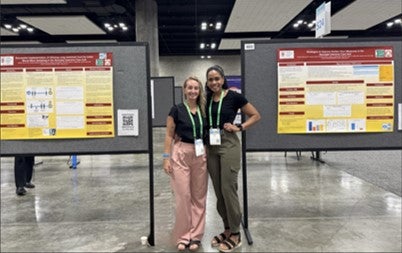Program Research/Scholarly Activity
The fellowship requires research/scholarly activity following the guidelines outlined by the American Board of Pediatrics’ scholarly activity requirement. An individualized scholarly oversight committee for each fellow is formed and will mentor each fellow through his/her scholarly activity.
Research conferences presented by fellows and attendings are designed to present results of current projects, discuss new protocols and critique proposed research design. Fellows are expected to present their research at a regional and national research meeting such as the Society for Pediatric Research meeting or an appropriate subspecialty society research meeting. Fellows are encouraged to attend national in-person conferences with generous reimbursement if their abstract(s) is accepted for presentation.
A manuscript submitted to a peer-reviewed journal is expected for completion of the scholarly activity. The design, implementation and completion of a fellow CQI project is expected prior to program completion.
The fellow with the guidance of an attending neonatologist, will also design and implement a quality improvement project, usually through several cycles. These are often presented at regional and national quality congresses, such as VON Annual Conference and Illinois Perinatal Quality Collaborative Conference.
Scholarly Activity (snapshot)
Presentations/Posters
American Academy of Pediatrics National Conference and Exhibition (AAP NCE)
AAP Perinatal & Developmental Medicine Symposium
Central Association of Obstetricians and Gynecologist (CAOG) Conference
Envision Neonatology Fellows Conference
International Meeting on Simulation in Healthcare (IMSH)
Pediatric Academic Society (PAS)
Publications
Marty D, Sorum K, Smith K, Nicoski P, Al-Sayyed B, Amin S. "Nosocomial Infections in the Neonatal Intensive Care Unit" Neoreviews. 2024;25(5):e254-e264
Holthaus E, O'Neil M, Jeske W, DeChrstopher J, Goodman J, Glynn L, Levin S, Muraskas J. "Endocan: A biomarker for endothelial dysfunction and inflammation, linking maternal obesity and pediatric obesity in a cohort of preterm neonates. Eur J Ob Gyn. 2024;297:132-137
Goldsmith J, Muraskas J. "Nucleated Red Blood Cells and the Timing of Hypoxic Ischemic Encephalopathy." Neonatal Today. 2023;18(11):164-165.
Cheng E, George AA, Bansal SK, Nicoski P, Amin S. "Neonatal Hypocalcemia: Common, Uncommon, and Rare Etiologies." Neoreviews. 2023;24(4):e217-e228.
Manalastas M, Shine KC, Yuan A, DeChiaro BA, Weiss MG, Amin S, Dina P, Muraskas JK. "Neonatal serial creatinine levels as an adjunct biomarker in timing of fetal neurologic injury." Euro J Ob gyn. 2023;18:100191.
Manalastas M, Zaheer F, Nicoski P, Weiss MG, Amin S. "Acetaminophen Therapy for Persistent Patent Ductus Arteriosus." Neoreviews. 2021;22(5):e320-331.
Maclean J, Katebian R, Suh E, Mirza K, Amin S. "Neonatal Hemophagocytopathic Lymphohistiocytosis." Neoreviews. 2019;20(6):e316-325.